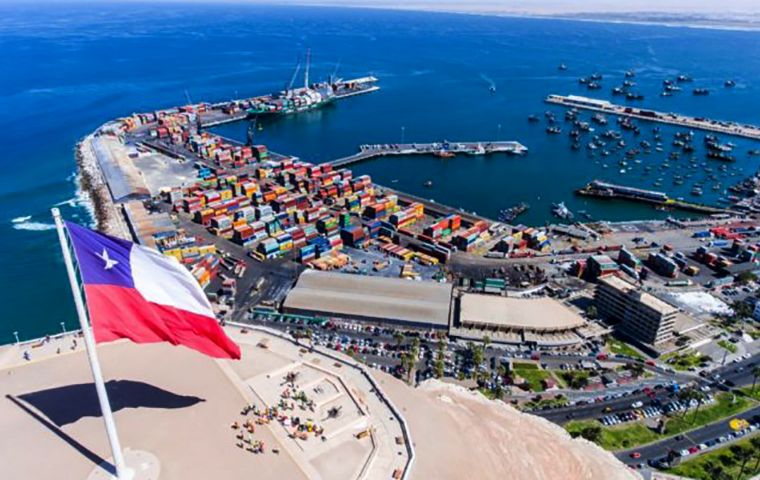MercoPress. South Atlantic News Agency
Chilean Port of Arica to demand advance collection of Bolivian import charges after August's fees unpaid
 The Bolivian agency has already charged its customers for port services but has in turn refused to pay it to the port operators
The Bolivian agency has already charged its customers for port services but has in turn refused to pay it to the port operators The Chilean port of Arica has announced it would seek to collect Septermber's dues in advance for Bolivian imports after that country's Port Services Administration (ASP-B) warned it would not be paying for services used during August.
Following a public statement from ASP-B that it would not be paying for the services provided during August, the Puerto Arica Terminal (TPA) Friday announced that as of September 20 it will apply an advance charge on each service requested.
TPA's General Manager Gabriel Tumani explained that the measure stems from Article 13 of the Manual of Rates and Services of the Port of Arica, which specifies that “users who have unpaid invoices at the date of the request for new services, will be required to pay in advance for these services.”
Tumani also pointed out that this provision seeks to ensure that debts do not pile up. Hence, if the timely and complete payment of the services provided in the first half of August does not occur, which were duly invoiced on August 20, that is, within a maximum period of 30 days, the TPA will have no choice but to make the measure effective.
“It does not seem reasonable that the ASP-B decides not to pay for the services provided by the Port of Arica, if those services were charged in advance from importers with the values of the public rate as of August 5,” Tumami said.
The Bolivian agency says through its website “that it will not pay the public rate of the Port of Arica, but on the other hand in Bolivia, it charges it and also applies its own readjustment that increases the cost of services. What corresponds is that it fulfils its commitments and pays the value that it has already charged its clients,” Tumani went on.
Tumami also urged the ASP-B to resume commercial negotiations through a Technical Commercial Commission with the Arica Port Company and the ASP-B, whereby a proposal for tariff discounts, in the long run, had been agreed upon. He added that the Port of Arica has always been open to dialogue.
The official underscored that that they were open to signing a new agreement with ASP-B, which the Bolivian party had deemed positively in July but later ignored. This agreement considers the validity of three years, with an average discount of 38% to 23 cargo services. The TPA official indicated that the ASP-B asked for all those considerations and suddenly changed its mind in August.
“We are very happy to see that importing clients in Bolivia are using the Direct Dispatch service in a good way, even reaching levels over 30%. We invite our clients to continue using this tool that has 0 costs for them, on the side of the Port of Arica and that will allow them in the face of this contingency, to withdraw their cargo without problem,” added Tumani.




Top Comments
Disclaimer & comment rulesCommenting for this story is now closed.
If you have a Facebook account, become a fan and comment on our Facebook Page!